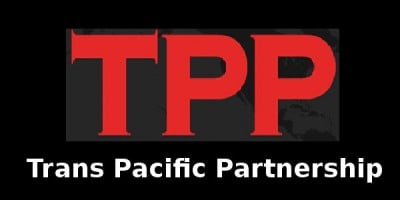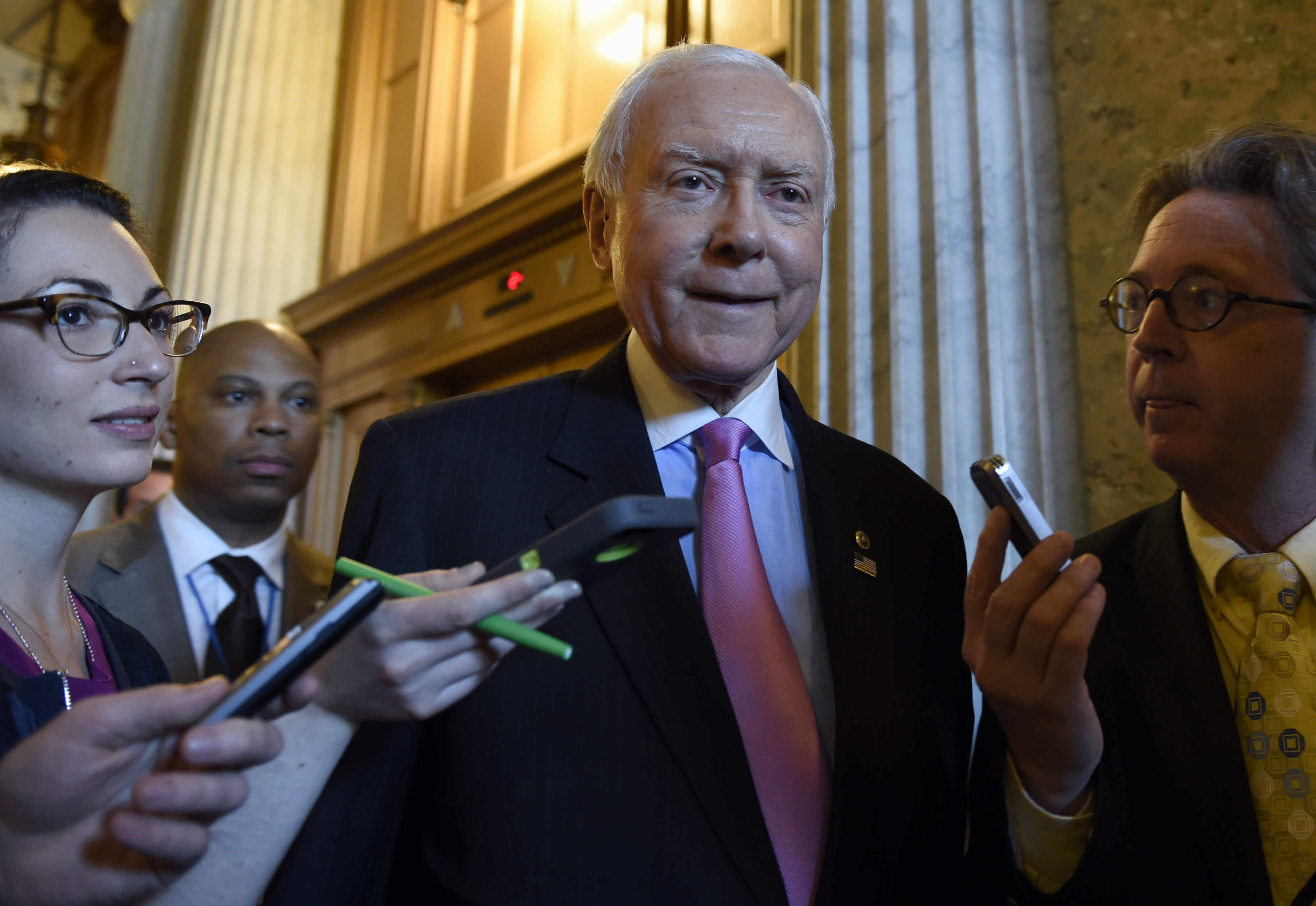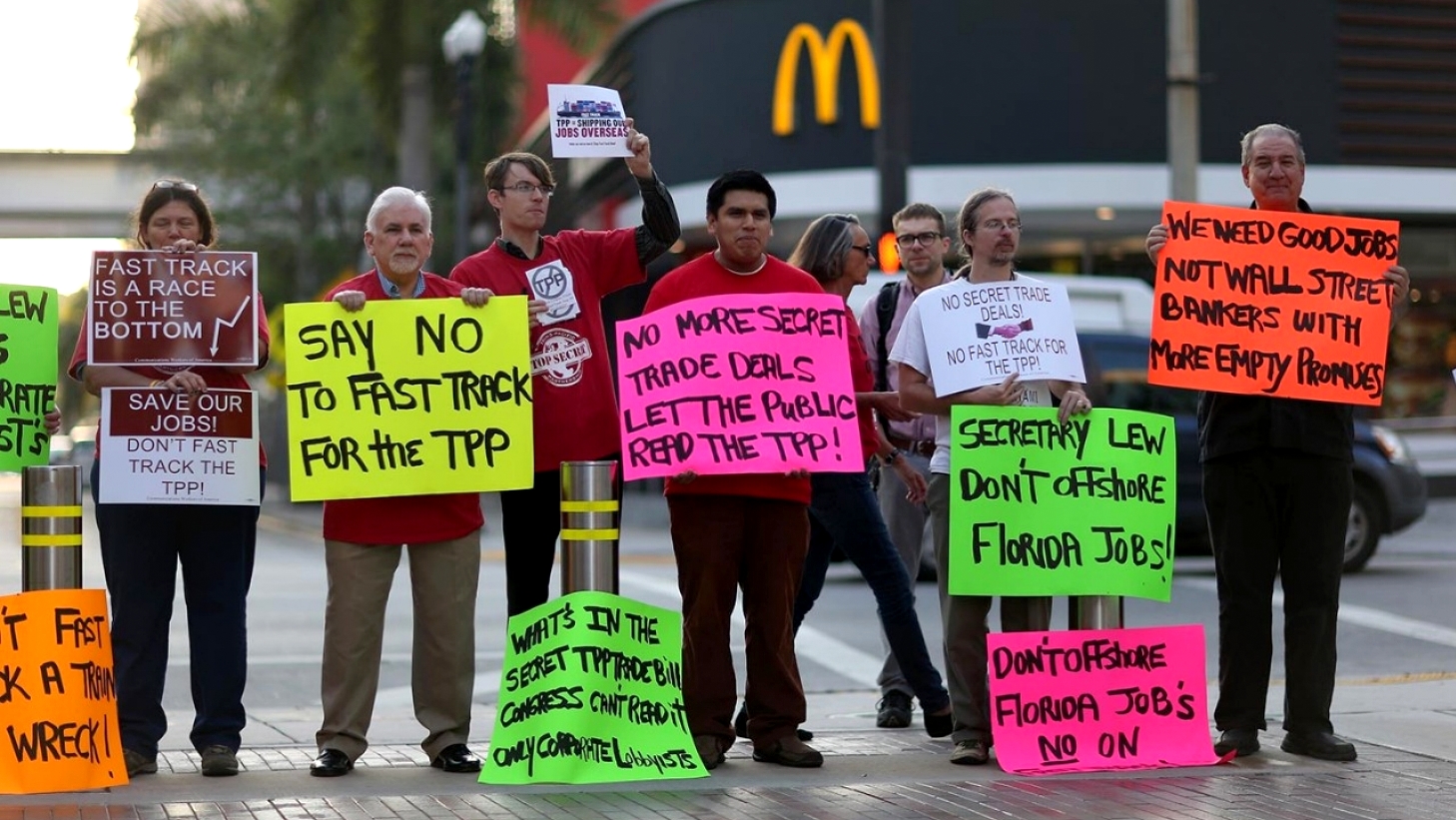Spread The Word: TPP Is Toxic Political Poison That Politicians Should Avoid

After nearly six years of negotiations, trade ministers recently announced they had reached agreement on the text of the Trans-Pacific Partnership. This does not mean the TPP is a done deal. The next hurdle for this rigged corporate power grab is to convince the participating governments, including Congress, to ratify it. In the United States, the trade justice movement, which has grown to be broad and diverse, can stop the TPP.
Here are two immediate actions you can take to stop the TPP: Click on the links to sign the petition telling Congress to reject the TPP and register for the mass mobilization in Washington in November.

A policewoman removes activist Kevin Zeese for protesting the Trans-Pacific Partnership (TPP) as U.S. Trade Representative Michael Froman (R) testifies before a Senate Finance Committee hearing on “President Obama’s 2015 Trade Policy Agenda” on Capitol Hill in Washington January 27, 2015. The top U.S. trade official urged Congress to back the administration’s trade agenda on Tuesday and said an ambitious Pacific trade pact is nearing completion. Froman said the administration looked to lawmakers to pass bipartisan legislation allowing a streamlined approval process for trade deals, such as the 12-nation Trans-Pacific Partnership. REUTERS/Kevin Lamarque
Both chambers of Congress must ratify the TPP by a majority vote using a process called “fast track.” The trade justice movement fought a multi-year campaign to prevent Congress from giving the president fast-track trade authority. We delayed it for much longer than the corporate traders wanted, forcing the TPP into the election year. Since the TPP is “Toxic Political Poison,” an election year is not when they wanted to consider it. The corporate traders were required to compromise to pass fast track. One key compromise was making the text of the agreement public for 60 days before Congress considers it. This is a tremendous opportunity to educate and mobilize people.
Just after the TPP negotiators reached an agreement, we asked Ralph Nader if the TPP could be stopped. He said, “It will be stopped on its demerits.” He further noted its wide impact, saying, “Its scope is everything,” and described it as a “global corporate coup … the most brazen corporate power grab in American history.” The TPP, he said, is “a major peril to our national authority” that is “ceding our sovereignty, ceding our self-reliance, ceding everything we can do within the boundaries of the United States.”
He described how it takes legislative authority away from Congress and the White House and gives it to trade officials and trade tribunals. Nader described how it undermines the civil justice system, the third branch of government, and the federal court system because of trade tribunals with corporate lawyer-judges whose decisions cannot be reviewed by the federal courts. Nader described the TPP as “democracy suppression.”
If you care about corporate power versus democracy, and about jobs, the environment, health care, food, water, energy, climate, regulation of banks and more, then stopping the TPP needs to be a top priority. The agreement comes after six years of secret negotiations — secret to the public, media and elected representatives but not to hundreds of transnational corporations, their lobbyists and lawyers.
The deal is fragile. Negotiators had been near agreement for more than a year and the final two meetings were a struggle. The controversy around this the agreement will come out when it is made public and goes through national legislatures.
The campaign to stop the TPP and other rigged corporate trade agreements is planning ongoing actions. From Nov.14 to 18, when President Barack Obama and U.S. Trade Representative Michael Froman are in Asia for economic meetings, major actions will be held in Washington. Click here to register. People are sending emails to congressional leaders urging them to stop the TPP. A full-court press is planned for when the TPP is brought to Congress.
Politics of TPP getting complicated in Washington
The TPP will not have an easy time in Congress. Leading presidential candidates and congressional leaders have expressed opposition or serious reservations. And, some major corporate interests are opposed. An election year is not the time for controversial legislation, and the toxic TPP will be controversial.
The key will be the House of Representatives. Mega-transnational corporations and Obama are making passage a top priority. House Speaker John Boehner did too, and he was forced to resign because of his bullying tactics. He aggressively pressured Republicans to give Obama fast-track authority, pushing about 30 Republicans who opposed fast track to vote for it. After the vote, he punished those who opposed him, removed them from subcommittee chairmanships and from the Republican leadership. The Caucus revolted, and some of Boehner’s decisions had to be reversed. Members of the Caucus called for his replacement, and rather than fight that battle, Boehner resigned.
If this “Toxic Political Poison” can remove a Speaker of the House, will the next Speaker make passing the TPP a priority? Will he risk his career for Obama’s top priority?

“Unfortunately I am afraid this deal appears to fall woefully short” Sen. Orrin G. Hatch (R-Utah), chairman of the Senate Finance Committee and one of the most important senators in the trade deal debate. (Susan Walsh/AP)
During the final negotiations key members of both parties wrote the Obama administration, warning there is no guarantee TPP will be approved by Congress. Sen. Orrin Hatch (R-UT), Sen. Ron Wyden (D-OR), Rep. Paul Ryan (R-WI) and Rep. Sander Levin (D-MI), said they better not bring back a bad deal because Congress will not support it. After the deal was announced, Hatch, chairman of the Senate Finance Committee and one of the most important senators in the trade debate, said, “Unfortunately I am afraid this deal appears to fall woefully short.”
This week, Big Pharma expressed its anger at the TPP requiring “only” an eight year patent monopoly for biologic drugs, when 12 years are the law in the United States. The U.S. will have to harmonize its laws with the TPP. Obama held a meeting with the pharmaceutical executives at the White House to assuage them, but he failed. The Hill Reports Big Pharma is “searching for a playbook in its effort to keep Congress from ratifying the deal next year.” Senator Hatch says that support for the TPP is shrinking in the Senate and “I’ve heard some very trying things that may very well make it impossible to pass.” The largest recipient of pharmaceutical funding is Majority Leader Mitch McConnell. He is also funded by the tobacco lobby, which is trying to top the TPP.
However, we know that we can’t take anything for granted. Enough promises and arm-twisting by the president, congressional leadership and heads of transnational corporations “convinced” just enough members of Congress (with massive donations) to vote for fast tack as were needed. We will have to do more than make phone calls and write emails to stop the TPP and protect our communities.
The TPP is a bad deal. Just like every other similar agreement, it is going to outsource jobs, lower wages globally, increase the wealth divide, increase the U.S. trade deficit, undermine democracy, weaken the federal court system, degrade the environment and undermine sovereignty at every level of government. The more people who learn about this deal, the worse it will look, and if we resist it, the likelihood of passage in Congress will shrink.
And, similar to the TPP, the Transatlantic Trade and Investment Partnership is having troubles in Europe. Europeans see TTIP either not advancing or going in the wrong direction because of the heavy handedness of the U.S. The French negotiator said: “France is considering all options including an outright termination of negotiations.” More than 3 million people across Europe signed a petition calling on the European Commission to scrap the agreement and hundreds of thousands marched in Berlin on Oct. 10 opposing the TTIP. People realize that rather than opening up new markets, since the U.S. and EU countries already trade a great deal, it will privatize of public services for corporate profits.
As TPP struggles, protests increase

Police remove activist Margaret Flowers for protesting the Trans-Pacific Partnership during a Senate hearing in January. (Reuters/Kevin Lamarque)
The more than two year fight in Washington to stop fast track also made the environment more complicated for proponents. The battle over fast track was a brutal one. The final legislation built in requirements that cause multi-month delays from the time negotiators reach agreement to the time the TPP goes to Congress. And it built in the requirement that trade agreements be made public for 60 days before Congress begins to consider them. We will also know what laws need to be changed to comply with the TPP’s requirements. This gives the trade justice movement time to educate and mobilize people in opposition.Many of the challenges facing the negotiators are the result of people rising up all over the world against these trade agreements. This has made it more difficult for governments to negotiate, as they know if they go too far they risk rejection at home.
Even with fast track, it will be challenging to get Congress to ratify trade agreements. The timing has also put the countries involved in a bind, as multiple countries — especially the U.S. — will be in the midst of elections. The elections make it more complicated because in both parties there are key candidates like Hillary Clinton, Bernie Sanders and Donald Trump who oppose the agreements, as does Green Party candidate Jill Stein, making the TPP an election year issue. Members of Congress also seeking re-election know the TPP is toxic and supporting it could cost them their political careers.
Stopping the TPP and other trade agreements is going to require a mass mobilization on the streets and online. Political activists now recognize that the TPP impacts every issue, which is good for building a unified movement against it because that is necessary.

Labor leaders, environmental groups and lawmakers rally against fast-track authority for secretive trade pact
The TPP gives incredible power to foreign banks to move money in and out of countries without restrictions. It minimizes regulation of big finance to allow risk-tasking that endangers the world economy. Countries that need money will be enslaved by loans from big finance like Citigroup, and once they are in debt, they will be unable to stand up to the demands of banksters who threaten them as we witnessed recently in Greece.At its root, the TPP is about modern colonialism. It is the way that Western governments and their transnational corporations, including Wall Street banks, can dominate the economies of developing nations. To be part of the TPP, governments are required to allow foreign ownership of property, including buying land in signatory countries. The TPP allows corporate trade tribunals to overrule their laws, acquire resources cheaply and provide slave wages to workers. And, if all else fails, the U.S. and allied militaries will be there to enforce agreements.
The reality is that without trade justice there cannot be climate justice, food justice; there cannot be health justice or wage justice. Injustice in trade undermines all the issues the social movement is working to correct.
As a result the largest trade justice movement has developed and is growing. Be part of this cultural shift that will challenge corporate power and build the power of people.
Take Action:
- Join us in writing Congressional leadership and urging them to stop the TPP.
- Join us in taking action to stop the TPP, mobilize for November actions in Washington, DC. If you can’t make it to DC there will be opportunities for you to support these actions locally.
Kevin Zeese and Margaret Flowers co-direct Popular Resistance.

